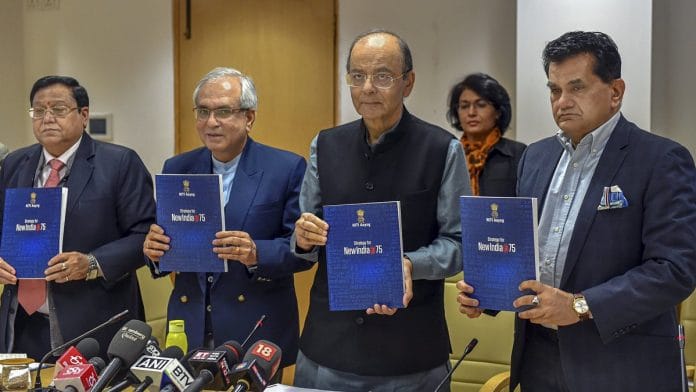The Niti Aayog report claimed that the move will attract young law graduates and help improve accountability in governance.
New Delhi: Niti Aayog has pitched for a pan-India exam to select cadre for the lower judiciary, saying it will attract young and bright law graduates and enhance accountability in the governance system.
The think tank Wednesday came out with a national strategy for new India, which defines objectives for 2022-23.
“An all-India judicial services examination on a ranking basis can be considered to maintain high standards in the judiciary. The selection process may be entrusted to the Union Public Service Commission (UPSC) for a cadre of lower judiciary judges, Indian Legal Service (both centre and states), prosecutors, legal advisors, and legal draftsmen,” it said.
The report claimed that the move will attract young and bright law graduates and help build a new cadre “that can enhance accountability in the governance system.
The report suggested the introduction of an administrative cadre in the judicial system to streamline processes.
“To maintain judicial independence, the cadre should report to the Chief Justice in each High Court,” it said. There are 24 high courts in the country.
The think tank said, a performance index for judges should be considered and a separate state-wise index for “ease of getting justice” should be prepared.
It said there is a need to facilitate the availability and usage of video-conferencing facilities to assist in speedy access to justice and to minimise logistical issues. “At present, even the available video-conferencing facilities are not utilized optimally,” it said.
The government has in the past proposed an all-India judicial service. But nine high courts have opposed the proposal to have an all-India service for the lower judiciary.
Eight others have sought changes in the proposed framework and only two have supported the idea.
The Narendra Modi government has given a fresh push to the long-pending proposal to set up the new service to have a separate cadre for the lower judiciary in the country.
The idea was first mooted in the 1960s. Seeking to overcome the divergence of views, the government had recently suggested to the Supreme Court various options, including an NEET-like examination to recruit judges to the lower judiciary.
National Eligibility cum Entrance Test (NEET) is conducted for admission to medical colleges.
There were vacancies of 4,452 judges in subordinate courts in the country as per the figures released on December 31, 2015. While the sanctioned strength is 20,502, the actual number of judges and judicial officers in subordinate courts is 16,050.
At present, various high courts and state service commissions hold exams to recruit judicial officers.- PTI







Why do you need an All-India exam for Muncifs.?
Many States have rejected this proposal already. Why don’t you mind your business? High Courts of the respective States are there to take care of it!
Introduction of NEET in 2017 snatched my medical seat on a low margin for which I had fought for with 5 years of strenuous hardwork. After a big U-turn in life, when we begin to aspire and work towards a new goal, Modi is bringing changes which is doing nothing but ruining our lives. Please do something productive instead of devastating our ambitions,goals and career?
Shouldn’t be minimised.
It is very unfortunate to know that the committees have planned such tailoring decisions on aspirants who for some reasons or the other can not give exams at early age. Reducing the age of the general as well as any other category will result in demotivation of the aspirants. Moreover the reasoning of reducing the age is absolutely irrelevant and superficial. The age limit criteria should not be changed as changing it will prove to be very difficult for serious candidates who gives every day and night to make it to the Civil Service. The government should not implement this report and idea.
I don’t see why or how a “PAN-India” exam will help the objective of a better lower judiciary.
Lower judiciary has their service and conditions and discipline controlled by the high court of the state which are each quasi independent.
some states have better quality lower judiciary, like delhi or karnataka or tamil nadu or maharashtra or gujarat.
Nobody is barred from taking multiple exams to be selected in the appropriate lower judiciary. Once they are in the lower judiciary of that state, they have to continue till they retire or reach the high court. Once they reach high court, supreme court can authorize or mandate transfer to another high court.
So at the end of the day, the proposal to have an “All india” service of lower judiciary is without any reasons. This article does not give any REASONS other than a vague reason that it will attract more young lawyers etc. Already young lawyers who are coming from national law schools etc are taking these state level exams.
So what is the great good reason for changing a working system? The lower judiciary is already attracting decent candidates. If the argument is that they should be all paid uniformly, that can also be taken care of by central govt if it supports the payments or salaries in the existing structure.
At best, there can be a “all india” exam, and it should be left to the high courts of each state who or how they will induct those who pass these exams. As a corollary, such a all india exam must be deemed to be tougher than any exam of any state judiciary. If that happens, the people who pass these exams can apply to multiple states, and then they will have to satisfy additional criteria, such as knowledge of local language, or any other criteria set by that high court.